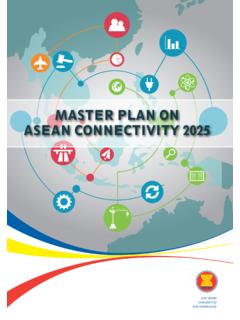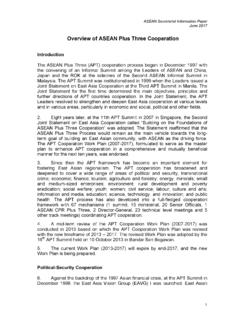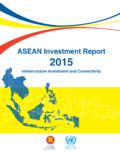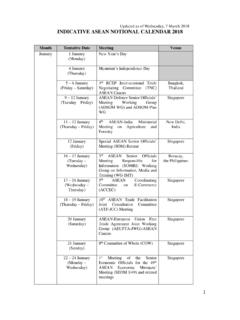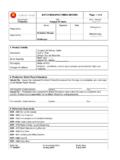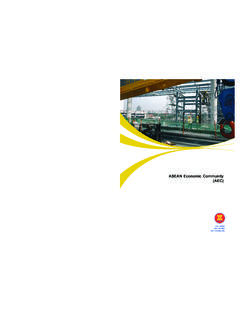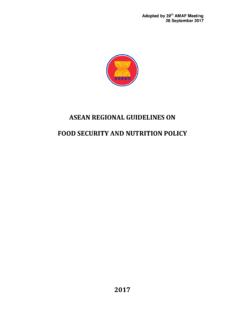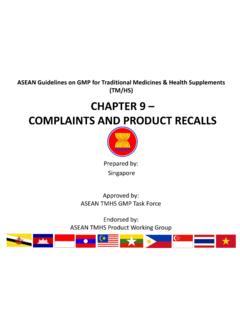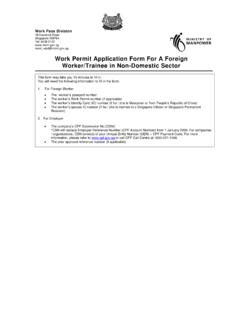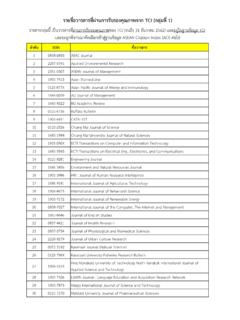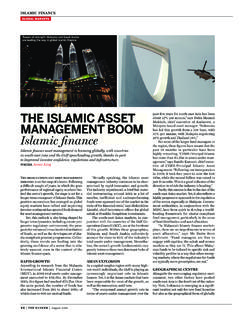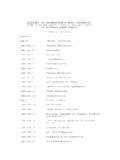Transcription of JOINT DECLARATION ON GASTRONOMY TOURISM …
1 FINAL. JOINT DECLARATION ON GASTRONOMY TOURISM . BY asean TOURISM MINISTERS. WE, the TOURISM Ministers of the Member States of the association of southeast asia nations (hereinafter referred to as asean ), namely Brunei Darussalam, the Kingdom of Cambodia, the Republic of Indonesia, the Lao People's Democratic Republic, Malaysia, the Republic of the Union of Myanmar, the Republic of the Philippines, the Republic of Singapore, the Kingdom of Thailand, and the Socialist Republic of Viet Nam (hereinafter referred to collectively as asean Member States ), gathered in Chiang Mai, Thailand, on 25th January 2018 for the Twenty- First Meeting of asean TOURISM Ministers. RECALLING the asean Economic Community Blueprint 2025, which focuses efforts on enhancing the competitiveness of asean as a single TOURISM destination.
2 RECOGNISING the integral role that GASTRONOMY plays in building competitive destination brands and its ability to be a key driver to achieve inclusiveness and sustainable development for local agricultural producers, local artisans and young artisan chefs in the globalization process, and to re-connect rural and urban environments. If managed well, gastronomic TOURISM could be an effective means of poverty reduction, resource efficiency, environmental protection and climate change mitigation, and the protection of cultural values, heritage and bio- diversity;. DESIRING to develop and strengthen sustainable gastronomic TOURISM in southeast asia . DETERMINING to encourage cooperation between asean Member States, related international GASTRONOMY experts, TOURISM stakeholders and global professionals in the fields of agriculture, culture, art, and 1.
3 FINAL. TOURISM in order to support the development of more environmentally, socially, culturally and economically sustainable means of food production and consumption and to promote a deeper understanding of gastronomic TOURISM in southeast asia ;. DO HEREBY ENDEAVOUR TO: 1. UPHOLD the general principle that the development of GASTRONOMY and TOURISM is a vehicle for the transmission of culture and embrace its ability to achieve sustainable development goals. Sustainable local, regional, and global food systems are important for our future. GASTRONOMY practices will open up innovative solutions for sustainable TOURISM , spur local employment while preserving local tradition and diversity by harnessing and rewarding authenticity;. 2. VALUE AND WELCOME the inclusion of the young generation and all genders to express their creativity through the art of food (including, but not limited to, food presentation, food styling, food dialogues, food souvenirs, and food pairings).
4 3. LEVERAGE cultural assets to transform asean communities into vibrant, enticing, and engaging places to live, work, and visit. Successful creative gastronomic initiatives have been shown to create a strong sense and character of the place, attract new visitors, and serve as a catalyst for local innovation and positive economic development for small to medium sized enterprises ( SMEs );. 4. SHARE knowledge among asean Member States to substantially improve asean gastronomic experiences so as to provide livelihoods for farmers as well as nutritious products for locals and visitors;. 5. FOSTER the interrelation between GASTRONOMY and TOURISM as a medium for inter-generational cultural exchange. Cross-cultural exchange, if properly managed, enhances inclusive economic development, sustainable practices and rich food experiences.
5 Hence, gastronomic TOURISM helps to create a strong sense of place for branding 2. FINAL. and marketing destinations, and also assists in maintaining and preserving local heritage and identity, and protecting biodiversity;. 6. EMPOWER local communities by guiding, facilitating, and supporting leaders in asean cities, regions, and cultural innovation initiatives to understand the region's culinary value chain and to promote the full potential of each asean Member State's distinct food, cultural heritage, art, and TOURISM assets;. 7. INVEST in young artisans and chefs to accelerate innovative enterprises, which contributes to a better quality of life by highlighting distinctive food cultures, educating for better health and sustainability, and stimulating the development of gastronomic related produce, products or initiatives.
6 8. SHOWCASE the region's distinct cultural identity and food assets internationally by giving visibility to traditional food ways;. 9. CREATE the awareness of wider food issues for healthy living and sustainability, including the management of food waste, through educational programs and wider citizen engagement projects; and 10. RAISE citizen awareness about the food they eat, the value of local products, and the need to innovate in order to protect local produces, thereby generating long-term benefits by promoting better and healthier lifestyles and supporting responsible SMEs. ADOPTED in Chiang Mai, Thailand, on Twenty-Fifth day of January in the year Two Thousand and Eighteen, in a single original copy, in the English language.
7 **. 3.
